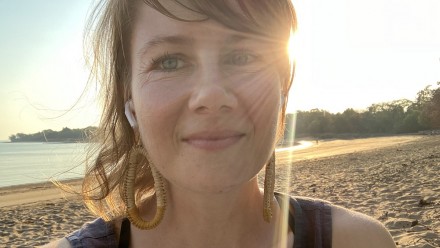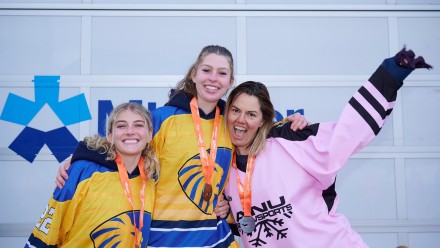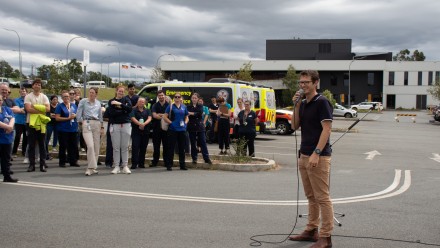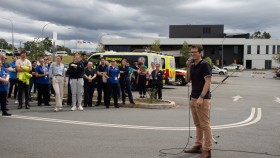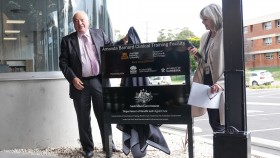A climate of uncertainty fostered a spirit of connection
By Dr Marrwah Ahmadzai
I am an obstetrics and gynaecology registrar in a tertiary hospital in Australia. I never imagined I would find myself working in the public health system as a junior doctor through a global pandemic.
In the initial days of the pandemic as television screens filled with images of the world progressively shutting down, panic buying wreaking havoc in our local supermarkets and mass graves being dug overseas, helplessness washed over me. I also felt fear. Fear about being thrust onto the proverbial front line against an enemy that cannot be seen, that discriminates against none and is fiercely aggressive despite all our measly yet best defences. About taking the virus home to loved ones. About the prospect of being deployed to a coronarvius ward. About keeping up with constantly evolving evidence and not being informed enough.
As it turned out, I had little direct involvement with coronavirus in those initial days.
But I witnessed the substantial indirect impacts. Public health restrictions meant some women laboured without support people, making what should have been an exciting time tainted with anxiety. Others expressed interest in changing their birth plan to birth at home to avoid the hospital setting. Elective gynaecological surgeries were cancelled across the nation. I worry about the number of crucial, time-critical diagnoses that may have been delayed in this pause.
Doctors in training were one of many groups severely affected. Exams and courses were cancelled or delayed, disrupting training, and delaying progression. My colleagues who did not have fixed contracts and worked as locums had their plans thrown into jeopardy due to state border closures and lockdowns. Education and training were largely put on the backburner to prioritise service provision.
The pressure on the workforce was palpable as any COVID leave amongst our cohort meant the workload had to be absorbed by those left on the floor. In some states, students faced the prospect of early entry into the workforce. I made the decision to delay my application for specialty training by a year, with no real guarantee that the following year would bring any ease.
Lack of connection made an already uncertain time worse. Communication had to adapt through full personal protective equipment. We avoided congregating in tea rooms to reduce the spread of the virus. Life oscillated between work and home. Despite these challenges, healthcare systems rapidly adapted to provide care. I used telehealth for the first time. It allowed me to engage with women from referral areas that would otherwise not be able to travel to the hospital. For all its benefits, however, I was frustrated to not be able to examine patients or read non-verbal cues.
The advent of the vaccine brought hope. In antenatal clinics, we put concerted effort into encouraging women to have the vaccine and answering questions regarding the evidence behind these recommendations. We struggled to fit in these discussions on top of already stretched antenatal visits. We were also conscious of the patients waiting outside and avoiding crowding in the waiting rooms.
The experience of junior doctors through the pandemic has not been homogenous, but my story is a relatable one.
I lost my uncle to coronavirus in Afghanistan in the first year of the pandemic. It was difficult to grieve from a world away. I heard stories of desperation from relatives, about how they were buying oxygen cylinders to use at home without any prior experience, on account of hospitals running out of essential supplies. I felt guilty and helpless and wished I could use my skills to help.
The opportunity arose in the following year. I heard about a COVID-19 peer support program founded by Associate Professor Dipti Talaulikar. Keen to do something tangible, I volunteered. The program initially consisted of online webinars on various coronavirus-related topics from different specialties. I facilitated a webinar on considerations for obstetric care during the pandemic. In preparation, I pored over all the available evidence and felt I learnt more than any of the participants. The response and interest were overwhelming, with people logging in from India, Australia, Qatar, and Fiji.
The program evolved with time into The Link, a broader initiative supporting medical students, healthcare innovation, medical education, and ethnically diverse female health professionals through four distinct arms. Staying on as a volunteer in the Link and Grow arm has been a silver lining of connection in the pandemic. It has allowed me to connect with inspirational clinicians and work towards supporting fellow female health professionals in a post-COVID era. My message to other women in healthcare who may be reading this is to find your passion within medicine and follow it. This will give you purpose and the drive to keep going against all odds, even a global pandemic.





